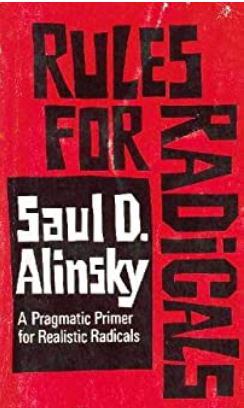13 Rules of Creating Chaos and Crisis Anywhere


Photo Courtesy: Knopf Doubleday Publishing Group
The farmers protest in Delhi (India) is going on for more than a year. It was started on August 9, 2020. Protestors wanted farm laws enacted in 2020 to be withdrawn, despite laws enacted by duly and democratically elected members of the parliament. Protestors had blocked the highway for months. They desecrated the Indian national flag at Red Fort. They now want to take their protest inside the city, and for that reason approached the Supreme Court of India to direct the Government to allow that.
But instead, the Supreme of India asked: Why farmers are protesting when farm laws have been stayed? The Supreme Court admonished a farmers’ group for choking the national capital by staging sit-protests on highways against the three farm laws. The court said, “You have strangulated Delhi by holding sit-in protests on highways … even blocked movement of armed forces and jeered them. Now you want to come inside the city and create chaos”
Would you believe that there could be a method behind such chaos and crisis. It is printed and published in ‘Rules for Radicals: A Practical Primer for Realistic Radicals’ by Saul Allinsky (1972), the man who proclaimed in a TV interview in 1966, ‘I’d Oragnize hell’
These 13 Rules can be used anywhere to create chaos and crisis with the objective of taking over the power. You cannot counter them as a law and order problem or tackle them through across the table talks.
The 13 rules are:
1. “Power is not only what you have, but what the enemy thinks you have.” Power is derived from 2 main sources – money and people. “Have-Nots” must build power from flesh and blood.
2. “Never go outside the expertise of your people.” It results in confusion, fear and retreat. Feeling secure adds to the backbone of anyone.
3. “Whenever possible, go outside the expertise of the enemy.” Look for ways to increase insecurity, anxiety and uncertainty.
4. “Make the enemy live up to its own book of rules.” If the rule is that every letter gets a reply, send 30,000 letters. You can kill them with this because no one can possibly obey all of their own rules.
5. “Ridicule is man’s most potent weapon.” There is no defense. It’s irrational. It’s infuriating. It also works as a key pressure point to force the enemy into concessions.
6. “A good tactic is one your people enjoy.” They’ll keep doing it without urging and come back to do more. They’re doing their thing, and will even suggest better ones.
7. “A tactic that drags on too long becomes a drag.” Don’t become old news.
8. “Keep the pressure on. Never let up.” Keep trying new things to keep the opposition off balance. As the opposition masters one approach, hit them from the flank with something new.
9. “The threat is usually more terrifying than the thing itself.” Imagination and ego can dream up many more consequences than any activist.
10. “The major premise for tactics is the development of operations that will maintain a constant pressure upon the opposition.” It is this unceasing pressure that results in the reactions from the opposition that are essential for the success of the campaign.
11. “If you push a negative hard enough, it will push through and become a positive.” Violence from the other side can win the public to your side because the public sympathizes with the underdog.
12. “The price of a successful attack is a constructive alternative.” Never let the enemy score points because you’re caught without a solution to the problem.
13. “Pick the target, freeze it, personalize it, and polarize it.” Cut off the support network and isolate the target from sympathy. Go after people and not institutions; people hurt faster than institutions.
(https://www.openculture.com/2017/02/13-rules-for-radicals.html)
Indeed, if you take a closer look at these rules, you would see those in action in every chaos and crisis leading up to important national elections.
Chicago Sun-Times, in its review had noted: “Alinsky’s techniques and teachings influenced generations of community and labor organizers, including the church-based group hiring a young [Barack] Obama to work on Chicago’s South Side in the 1980s…. Alinsky impressed a young [Hillary] Clinton, who was growing up in Park Ridge at the time Alinsky was the director of the Industrial Areas Foundation in Chicago.”
“Dear Saul,” Clinton wrote in the 1971 letter. “When is that new book [Rules for Radicals] coming out — or has it come and I somehow missed the fulfillment of Revelation? I have just had my one-thousandth conversation about Reveille and need some new material to throw at people.”
DISCLAIMER: The author is solely responsible for the views expressed in this article. The author carries the responsibility for citing and/or licensing of images utilized within the text.
